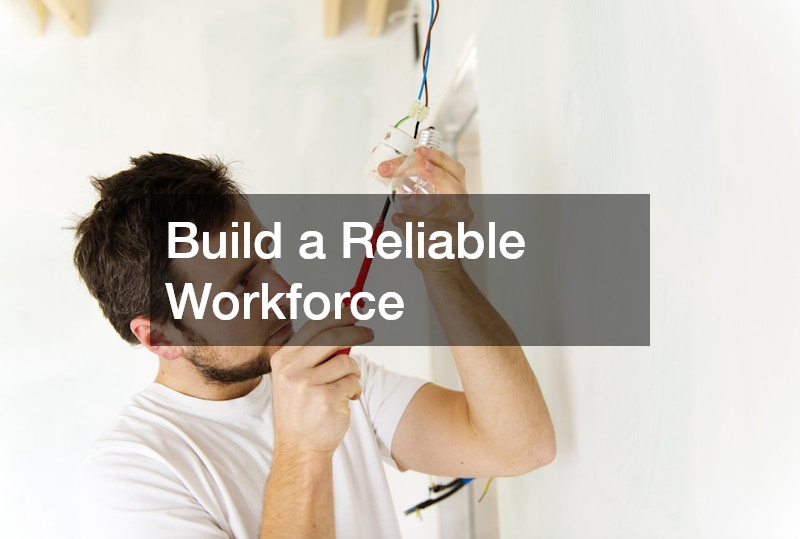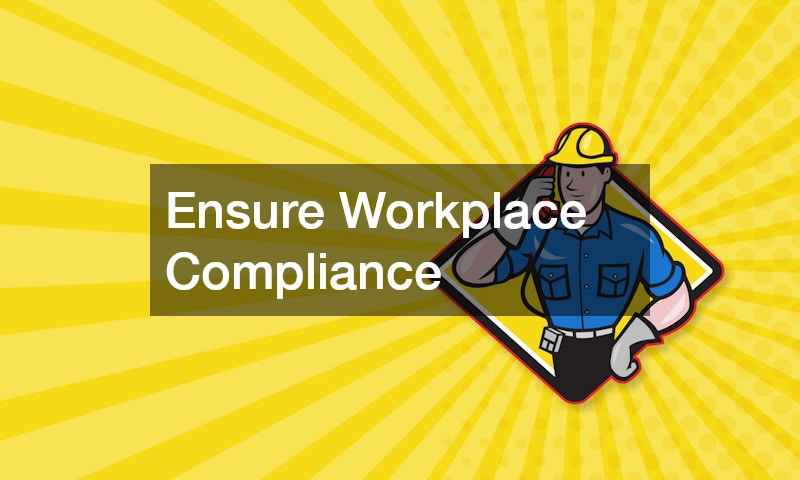In the competitive world of trade business, establishing a robust human resources strategy can be a game-changer. For HVAC companies, where the workforce is often the backbone of daily operations, understanding the significance of HR can spell the difference between success and struggle. From technician hiring and workforce reliability to employee satisfaction and workplace compliance, every aspect of HR plays a vital role. This article delves deep into why HR is an indispensable component for HVAC services, emphasizing its role in shaping a thriving business environment. By addressing key areas like skills training, talent retention, and fostering a positive workplace culture, we aim to illustrate how strategic HR practices can propel your business forward, ensuring not only growth but sustainability.
Boost Employee Satisfaction
The success of HVAC companies largely depends on the satisfaction of their employees, as a happy workforce leads to increased productivity and higher service quality. In any trade business, satisfied staff members are less likely to experience burnout and are more likely to invest their energy into providing excellent service. Hence, effective HR strategies focused on employee satisfaction are crucial to maintaining a motivated and proactive team.
For HVAC companies, boosting employee satisfaction involves understanding the specific needs of technicians and office staff, ensuring fair compensation, and providing opportunities for professional growth. Trade business employers who prioritize work-life balance, open communication, and recognition are often better positioned to retain skilled professionals. In this competitive industry, happy employees not only perform better but also act as brand ambassadors, attracting new talent.
To effectively boost satisfaction, HVAC companies should conduct regular satisfaction surveys, encourage feedback, and implement policies that support personal and professional well-being. By addressing issues such as job stressors and workload imbalance, your business can create a more harmonious work environment. Such initiatives not only reduce turnover rates but also lead to cost savings through the retention of experienced staff members.
Build a Reliable Workforce
A reliable workforce is the backbone of any successful trade business, especially in the air conditioning services industry where timely and efficient service is paramount. HR plays a significant role in building and maintaining this reliability by implementing thorough recruitment and training processes. Establishing clear job roles and performance expectations is essential in cultivating a workforce that consistently delivers high-quality service.
In air conditioning services, reliability begins with careful selection of candidates who possess not only the necessary technical skills but also the right attitude and work ethic. HR departments are tasked with conducting rigorous interviews, skill assessments, and background checks to ensure only the best candidates are brought on board. Once hired, continuous training and development programs are vital in maintaining service standards and fostering employee growth.
By leveraging strategic HR practices, businesses can ensure that their teams are well-equipped to handle the demands of the job, leading to improved service delivery and customer satisfaction. Investing in employee development and regular performance evaluations can significantly enhance workforce reliability, ultimately benefiting the company’s reputation and bottom line.
Streamline Technician Hiring
Efficient technician hiring processes are essential for any local air conditioning service seeking to remain competitive in the trade business. HR departments play a pivotal role in streamlining recruitment by using modern tools and techniques to find, attract, and retain top talent. Simplifying the hiring process not only saves time and resources but also ensures that new hires are aligned with the company’s values and goals.
To streamline hiring, HR managers should leverage technology such as applicant tracking systems and online recruitment platforms. These tools can significantly reduce the time spent on admin tasks, allowing HR professionals to focus on evaluating candidates’ skills and cultural fit. A well-defined hiring process helps to minimize turnover rates by selecting candidates who are most suitable for the roles and responsibilities of a technician.
Developing comprehensive job descriptions and efficient onboarding procedures further aids in the smooth integration of new hires. An effective HR strategy also involves continuous evaluation and adjustment of the hiring process to adapt to changing market conditions and workforce needs. By optimizing each stage of recruitment, your business can secure a steady pipeline of qualified technicians, ensuring operational efficiency and customer satisfaction.
Retain Top Talent Effectively
Retaining top talent is crucial for businesses specializing in HVAC installation, where experienced and skilled professionals are essential for quality service delivery. HR departments play a critical role in identifying and implementing strategies that keep high-performing employees engaged and committed to the company. This not only involves competitive compensation but also fostering a work environment that values growth, creativity, and collaboration.
A key strategy for retaining top talent in the HVAC installation field is the provision of continuous learning opportunities and career advancement prospects. HR solutions should include mentorship programs, advanced training sessions, and clear career pathways. Recognition programs and performance-based incentives are also effective tools in reinforcing commitment and reducing turnover.
Ensuring employees feel valued and appreciated goes a long way in maintaining loyalty. Regular feedback, open communication channels, and inclusion in decision-making processes are crucial HR practices that empower employees. Businesses that successfully retain their top talent can enjoy consistent high-quality service delivery, enhanced customer satisfaction, and reduced costs associated with recruitment and training of new staff.
Improve Skills With Training
In the increasingly complex world of HVAC system technology, continuous skill improvement is necessary for maintaining proficiency in service delivery. HR departments are instrumental in devising training programs tailored to enhance the existing skill set of employees while introducing new competencies. As part of a comprehensive employee development strategy, training ensures that workforce skills keep pace with technological advancements in the trade business.
To improve skills effectively, HR teams should first identify current competency gaps and future needs of their HVAC system technicians. Developing a structured training program tailored to these needs is crucial for effective learning. This could involve collaboration with technical schools, online learning platforms, or industry certifications to provide employees with access to the latest knowledge and techniques.
Offering continuous training opportunities signals to employees that the company is invested in their personal and professional development. It helps increase job satisfaction and retention by equipping staff with the skills needed to advance within the company. Enhanced skills translate into improved service quality and efficiency, ultimately benefiting the company’s bottom line while ensuring customer satisfaction.
Ensure Workplace Compliance
Ensuring workplace compliance is a vital aspect of managing an HVAC trade business, especially when handling tasks like AC replacement that involve technical and safety standards. Adhering to legal and industry regulations protects the business from potential fines and legal issues while ensuring a safe working environment for employees. HR departments are charged with the responsibility of staying updated on the latest compliance requirements and implementing them within the organization.
For AC replacement services, compliance involves following regional and national regulations related to safety standards, environmental laws, and labor laws. This requires HR to develop comprehensive policies, conduct regular audits, and provide necessary training to employees to ensure everyone is aware of their responsibilities. Establishing clear compliance protocols helps mitigate risks and enhances the company’s reputation for reliability and professionalism.
By fostering a culture of compliance, businesses not only avoid legal liabilities but also instill confidence among employees and clients. A proactive approach to compliance management includes regular policy reviews and updates, employee feedback systems, and a robust internal monitoring system. This commitment to compliance ensures a safer, healthier work environment, fostering trust and reliability in service delivery.
Protect With Strong HR Policies
Having strong HR policies is crucial not just for HVAC businesses but also for similar trades such as plumbing. Clear and well-structured HR policies guide proper employee conduct, conflict resolution, and operational procedures, creating a reliable and transparent work environment. These policies are pivotal in maintaining consistency and fairness across all levels of a trade business, fostering a culture of trust and integrity.
In the field of HVAC services, strong HR policies help protect both the business and its employees by outlining clear guidelines on issues such as safety standards, workplace behavior, and disciplinary actions. It is essential for HR to regularly review and update these policies to ensure they remain relevant and effective. This includes engaging with employees during policy formulation to garner insights and foster buy-in.
Effective HR policies also address diversity, equity, and inclusion, promoting a work environment where all employees feel respected and valued. By creating an inclusive atmosphere, businesses can harness a diverse range of perspectives and ideas, driving innovation and growth. Strong policies serve as the foundation for consistent and equitable management practices, securing the long-term success and sustainability of the business.
Enhance Service Through Growth
Growth is a key objective for any business involved in heating repair, as it directly correlates with enhanced service delivery and increased market share. Strategic HR practices play a critical role in managing growth effectively, ensuring that the business can capitalize on expanding opportunities without sacrificing service quality or employee morale. Achieving balanced growth involves a focus on recruiting skilled workers, providing continuous training, and fostering a positive work environment.
In the heating repair sector, growth often involves expanding service offerings, entering new markets, and increasing workforce capacity. HR departments are instrumental in supporting these initiatives by developing scalable recruitment and training processes that align with business objectives. This planning ensures that growth is sustainable, allowing the company to meet increased demand without overextending its resources.
By aligning HR strategies with growth objectives, businesses can enhance service delivery through improved efficiency, higher-quality work, and a stronger market presence. Investment in employee development and engagement is key to sustaining growth, as a committed and skilled workforce is crucial for executing expansion plans successfully. Ultimately, growth-driven companies in the trade business must integrate comprehensive HR initiatives to support and sustain their ambitions.
Create a Positive Work Culture
Creating a positive work culture is paramount for HVAC services aiming to attract and retain skilled professionals in a competitive trade business environment. A positive work culture results in higher employee engagement, productivity, and satisfaction, leading to better service outcomes and customer satisfaction. HR departments are key drivers in cultivating and maintaining this culture by promoting values of inclusivity, respect, and transparency.
The development of a positive work culture in HVAC services involves practices such as open communication, employee recognition, and participation in decision-making processes. Businesses should strive to create an environment where employees feel connected to the company’s mission and values. HR can facilitate this by organizing team-building activities, recognizing achievements, and encouraging feedback mechanisms.
Ultimately, a strong work culture enhances organizational cohesion and morale, making the business a more desirable place to work. This, in turn, attracts top talent and reduces turnover, ensuring the company has a team capable of delivering outstanding service. By prioritizing work culture, HVAC services can not only boost employee happiness but also achieve long-term business resilience.
Plan for Seasonal Demands
Planning for seasonal demands is crucial for any trade business including local emergency plumbers, as well as HVAC companies that often face variable seasonality. These businesses experience fluctuations in service demand based on seasonal weather patterns, requiring strategic workforce planning and resource management. Effective HR practices ensure that companies can scale operations efficiently to meet these variable demands without compromising service quality.
For HVAC companies, planning for seasonal demands involves forecasting service needs and adjusting staffing levels accordingly. HR has to work closely with operations to determine periods of peak demand and train a flexible workforce that can adapt to changing workloads. Tools such as temporary staffing solutions, overtime management, and strategic partnership with recruitment agencies can assist in managing these fluctuations.
Seasonal planning also involves ensuring equipment and supplies are available to support increased workloads, as well as maintaining rigorous scheduling to optimize resource use. By anticipating and preparing for seasonal demands, businesses can ensure continuity of service and maintain a competitive edge in the local market. Effective seasonal planning not only stabilizes business operations but also enhances the satisfaction of both employees and clients.
In conclusion, robust HR practices are not merely supportive but essential for the success of HVAC businesses. From boosting employee satisfaction and building a reliable workforce to streamlining technician hiring and retaining top talent, each component plays a critical role in organizational health and success. Strategic HR efforts improve skills through training, ensure workplace compliance, protect with strong policies, and enhance business service through planned growth, all while fostering a positive work culture and preparing for seasonal demands.
Implementing these comprehensive HR strategies ensures that HVAC businesses remain dynamic, competitive, and capable of delivering exceptional service in a fluctuating market environment. By prioritizing the human element within the trade business, companies can secure a loyal workforce that not only meets the immediate needs but also aligns with long-term organizational goals. Therefore, for those asking, “Why does HR matter for my HVAC business?” the answer lies in the sustained growth and stability achieved through dedicated human resource management.
By integrating proactive human resources strategies, HVAC companies and trade businesses will not only thrive in the present environment but will also be well-prepared to tackle future challenges, ensuring they continue to deliver high-quality service and achieve business longevity.










